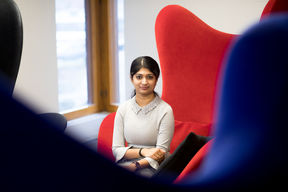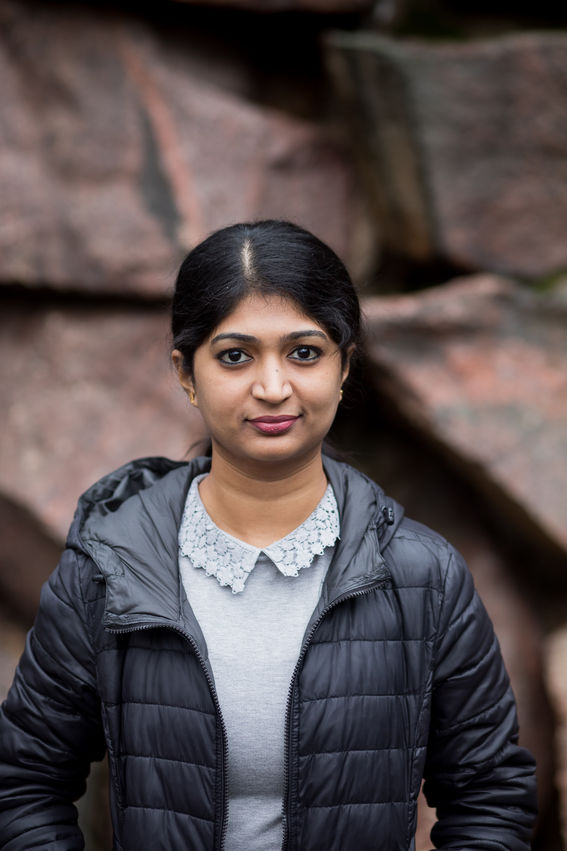‘The ethical issues in Artificial Intelligence are a hot topic all around at the moment’

A few years ago Nagadivya Balasubramaniam had just completed her bachelor’s degree and started working in India, at a software consultancy company. However, after just three months the work started to feel routine-like and repetitive. 'It was not a place I belonged to,' Balasubramaniam says sitting in Helsinki, four years later.
That feeling sparked the need to look for a master’s degree program. Balasubramaniam was particularly interested in UX – user experience – design and service design. ‘When we talk about UX and service design, it requires you to talk to people. It’s not the kind of work you can do just sitting in a cubicle.’
She wanted to study engineering that combined the human aspect as well. After looking for study opportunities, Balasubramaniam noticed there weren’t many universities offering specialized courses in service design engineering. Nordic countries were among the few providing such courses.
Balasubramaniam applied to Sweden and Finland to study, and ended up choosing studies in software engineering at Aalto University with a specialization in service design engineering. She has just submitted her thesis 'Using the ethical guidelines of AI for defining quality requirements' after having studied in Finland for three years, and the graduation looms ahead in December.
During her master’s studies, Balasubramaniam has been part of PREAGO, a research group supervised by Professor of Practice Marjo Kauppinen. She has been working in a project developing an e-learning application for healthcare professionals to tackle cross-cultural communication issues and in another project focusing on ethics relating to artificial intelligence, the topic in which she focuses in her master’s thesis.
Nagadivya BalasubramaniamAI is like a black box. Nobody really knows what’s happening inside. But companies are taking a step forward to comprehend what's inside.
‘The ethical issues in artificial intelligence are a hot topic all around at the moment, especially the autonomous decision-making systems,’ Balasubramaniam explains.
Balasubramaniam has now been offered an opportunity to continue her career at Aalto as a doctoral candidate – an offer she gladly accepted.
Companies recognize the impact of AI
When starting her thesis Balasubramaniam knew of an existing AI ethics challenge organized by the Ministry of Economic Affairs in Finland. Balasubramaniam and other research team members interviewed management-level people from 3–4 big companies in Finland participating in the challenge.
The participating companies are developing their own ethical guidelines for utilizing AI as part of the challenge.
Balasubramaniam and the other team members expected companies to find the ethical guidelines boring, but that hypothesis changed quickly. 'After the interviews we noticed that the companies are really considering these ethical issues and they want to address them and build proper guidelines.'
However, many of them do not yet have a proper way to implement the guidelines. As they can be rather vague, the connection between the ethical guidelines and an individual project is often hard to see.
One significant thing Balasubramaniam learnt was that in Finland transparency is highly important. ‘The companies here don’t want to cheat the customers or just collect user data and use it for other purposes than what they claim to collect it for. Their intentions were good and they seem to want to earn the users’ trust by being open and transparent with them.’
Nagadivya BalasubramaniamI feel like I learned the topics profoundly. I think that’s the kind of learning experience everyone should have.
Another important observation was that the companies are thinking about the purpose and influence that the AI technologies will cause. ‘AI is like a black box. Nobody really knows what’s happening inside. But companies are taking a step forward to comprehend what’s inside this black box,’ Balasubramaniam says.
According to her, companies want the designers, developers and other experts to know why the machine is suggesting a specific recommendation as well as to measure the impact made by the AI solution. ‘They want to make sure the impact is positive – not just for the end user but on a broader society level as well.’
With the doctoral studies, the project team members are aiming to include more companies to the research project and take the interviews to a deeper level.
‘The kind of learning experience everyone should have’
Looking back Balasubramaniam feels studying at Aalto University has been extremely flexible without the pressure to select particular courses or collect credits.
‘Back in India we had to complete eight courses in a semester. Here I had the flexibility and I completed the courses with a slower pace. It was a good thing; I feel like I learned the topics profoundly. I think that’s the kind of learning experience everyone should have,’ Balasubramaniam says.
Balasubramaniam also praises the professors for being very helpful and friendly. ‘If you have any difficulties, they’re there to help. For example, when I joined, Marjo Kauppinen told us that her office door is always open and you can come and ask whatever questions you have.’ Balasubramaniam took a few opportunities to meet her professor to talk about her course selection.
Balasubramaniam underscores that the professors seemed to be interested in the students also on a human level, asking how they are doing and are they adapting to Finland.
Aalto University also gets positive feedback for the university’s cross- disciplinary approach. ‘I was positively surprised about the cross-disciplinary projects and teaching at Aalto University. I worked with people who are business students – and their perception is totally different! It was eye opening for me.’
Studying at Aalto has also facilitated a new kind of social life. Balasubramaniam now has friends from Turkey, Italy, Mexico, and the Nordics. ‘I never thought I’d be able to mingle easily with people from other cultures. I’m glad I’ve managed to make good friends whilst in Finland.’
As Balasubramaniam does not drink alcohol, she has attended less the student parties – but has organized a lot of dinners and get-togethers at home instead. ‘I love to cook, and I cook a lot. I’ve managed to get all the ingredients that I’d need for my Indian cooking here from the various Asian shops.’
Having lived in Finland for some years, Balasubramaniam has started to appreciate the quietness and the space. When visiting home in India, the constant noise irritates her. ‘I’m so used to the quietness and people not poking you. In India when going anywhere, it’s usually pretty noisy. And I’m used to the punctuality of Finland.’
Authored by Hanne-Mari Tarvonen

Nagadivya Balasubramaniam, MSc student and doctoral candidate
Education: Bachelor of Technology in Information Technology (Anna University, India). Completing Master of Science (in Tech.) degree at Aalto University in December 2019.
Lives in: Espoo
Hails from: Coimbatore, India
The greatest professional achievement: The completed master’s degree and a conference paper
Has also
Partaken stage dramas in the form of scriptwriting & acting. ‘I’ve been doing stage dramas since the school days and written dialogs for a couple of big dramas. Here at Aalto we created a concept video explaining how an application works and we enacted it.’
Followed cricket since the age of five. ‘I have skipped classes to be able to watch the team I support play. In India, cricket is like a religion and a bonding factor. It’s something we talk about when we get together, over lunch and over dinner.’
Travelled in 11 European countries since the beginning of studies at Aalto University. ‘I had never travelled in foreign countries before I arrived in Finland, but I did a lot of research about the Nordics and spoke to my brother who lives in Sweden – so I knew what I was getting myself into when it comes to climate etc. So the culture shock wasn’t heavy at all.’
Read more news
Eden Telila's master's thesis contributed to Ramboll's geotechnical toolkit
Geoengineering alum Eden Telila helped Ramboll automate manual tasks.
Doc+ connects research impact with career direction
Doc+ panels have brought together wide audiences in February to discuss doctoral careers and their diversity.
Join a Unite! matchmaking event on forging new consortia for Horizon Europe applications
Calling researchers and industry partners to connect at a virtual matchmaking session designed to spark project collaborations for Horizon Europe funding. Registration deadline, 12 March.






